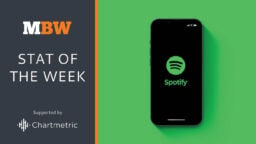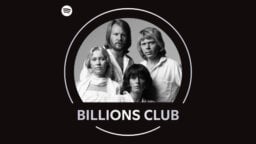The following blog comes from the CEO of the UK-based Music Managers Forum, Annabella Coldrick (pictured). She dissects the different ways that major and independent labels are distributing proceeds from Spotify share sales – and ponders what it all might mean for the lump sum coming from Facebook…
For the artist and management community, the most controversial element of Spotify’s transition to a publicly traded company was how (and if) the three majors and Merlin-member labels would share the proceeds from sale of their equity holdings.
These stakes were agreed as far back as 2008. At the time, music streaming was in the earliest stage of adoption (Spotify gets a mere two mentions in the IFPI’s 2009 Digital Music Report) and, although there were sensible rationale for the largest rights holders to demand equity, a lack of transparency surrounded these arrangements and the basis on which they were agreed.
We now inhabit a different world. Streaming has evolved into the record industry’s dominant revenue stream (IFPI reported a 41.1% increase in streaming revenue in 2017) and Spotify the dominant global service.
The Music Managers Forum has consistently argued that, if the combined value of all repertoire / market share was used as a means to secure equity stakes, then morally it should be shared with all artists regardless of previous commercial arrangements.
“Essentially, we’re talking about making the unattributed attributable. There’s a lot to untangle.”
In other words, the ideal scenario would be to treat these divestments as a one-off payment – from which all artists would gain. This is not, of course, a process without challenges. Essentially, we’re talking about making the unattributed attributable. There’s a lot to untangle.
At the MMF we understand that equity payouts are not that easy to calculate, particularly if artists and labels have changed business partners over the term the equity was held. In practice, it will likely be impossible to make distributions to everyone’s agreement.
We also think it’s important to manage expectations. Although the overall sums are large, when divided between thousands of artists they are unlikely to constitute a retirement fund.
However, if these deals were made on a broad-brush basis of ‘market share’ then, arguably, they should be returned to the widest cross section of artists – regardless of whether they’re still signed to a label, or whether they’re signed to a label distributed by another label. That would seem fair to those whose music was traded for equity in the first place.
Since April, a clearer picture is now emerging of what’s likely to happen. Or at least a little clearer.
So, what do we know?
Sony wrote to artist and managers in June saying they would also be sharing net proceeds of the $750m equity they have divested so far (half their holding) minus the actual costs related to acquisition and sale on a royalty basis, using an illustration of their US standard 16% royalty with deducted producer royalties.
They also employed an allocation methodology equally weighing the overall revenue and Spotify revenue to give recognition to artists on their current roster and in catalogue at the time the equity was obtained. This resulted in an allocation to nearly 100,000 eligible artists and participants with payouts beginning August 2018, and will continue as further equity is sold.
“some Warner artists will receive significantly more than 25%, and some a lot less – based on individual royalty rates.”
The positive news is SME won’t treat this payout against recoupment, and will share with all current distributed labels (e.g. through the Orchard) who should then pass onto the artists they work with.
However, they will not pay out to labels they are no longer in business with, so will retain 100% this income. Artists signed to these labels will not receive anything.
Warner have sold their entire stake of Spotify equity for $404m, and will be sharing $126m of the proceeds with artists according to their contractual terms. That means some will receive significantly more than 25%, and some a lot less – based on individual royalty rates.
Warners’ calculations are based on actual consumption on Spotify over the term of the deal from October 2008-March 2018 (from not all catalogue).
WMG wrote to artists representatives in August with more detail, stating the proceeds will be credited to artists’ account for the period to June 2018 as “equity proceeds”.
However, as the share is against recoupment, much of this will go to the bottom line and remain with the label. They also are sharing payments with distributed labels, but only if this is part of the contract – so if an artist is signed to a distributed label through ADA they are likely to get nothing.
It is also unclear what then happens to the money that’s not being distributed out of the artists’ section of the pot when catalogues have moved on and if this is included in the $126m artist payout or not.
Universal also publicly committed to share payments in March 2018, announcing that “consistent with UMG’s approach to artist compensation, artists would share in the proceeds of a [Spotify] equity sale.” No further information has come into the public domain and it is understood none of their shares have yet been cashed in.
“Beggars, Secretly and Domino have pledged to share as a minimum 50/50 of the equity proceeds with artists against recoupment – or more where the contractual split is higher.”
Merlin announced in May that it had sold 100% of its equity (estimated at over $100m). All labels that are part of the Merlin deal are seeing the equity paid across based on actual consumption on Spotify over the length of the deal.
Merlin labels can decide their own policy within the scope of WIN’s Fair Digital Deals Declaration.
Beggars, Secretly and Domino have pledged to share as a minimum 50/50 of the equity proceeds with artists against recoupment – or more where the contractual split is higher.
AWAL/Kobalt are treating the equity as income like any other and paying across as a revenue share (whilst retaining 15%) based on actual consumption on Spotify during the term of their Merlin deal.
With all of these, we understand income will start to come through this autumn.
So yes, the process is complex – but it’s also important, and for two important long-term reasons.
Firstly, trust.
Relationships between labels and artists, historically rather fractious, are now in the process of being realigned. Artists and managers are increasingly business partners with labels, not simply at the end of a supply chain where they sign over copyright for life. That was the old world; we’re now in the new.
The majority of labels are becoming closer to service companies, while many managers now run their artist’s own labels. We are frequently much closer due to these shared interests – but that also needs a shift in communication. Nobody wants to fall backwards into bad habits. As business partners, artists and managers should not learn of new deals via the trade press. They need information in advance.
“unattributable deals are still being agreed. Facebook being the biggest, with over $1bn being paid for the use of music for the next two years.”
And secondly, Facebook.
It would be easy to see Spotify as a one-off; as the last deal of its type before streaming altered the balance of the recorded business, but other unattributable deals are still being agreed. Facebook being the biggest, with over $1bn being paid for the use of music for the next two years.
Many labels are privately committing to share with artists, but again using different methodology – some using YouTube consumption, or YouTube+Spotify, as a proxy to payout in theory from this autumn.
Managers are not involved in these discussions about how this will work (even with the indies) and if we’re lucky will get an email at the time statements go out explaining how the calculations have been made. Again, the policy is being decided on old world principles of record labels being rights owners and artists and their team as content suppliers with no stake in the shape of the industry.
In the new world, we’re increasingly rights partners. Artists and managers should be treated as such, with far more engagement as to how these decisions are taken and greater understanding of what they mean.Music Business Worldwide







